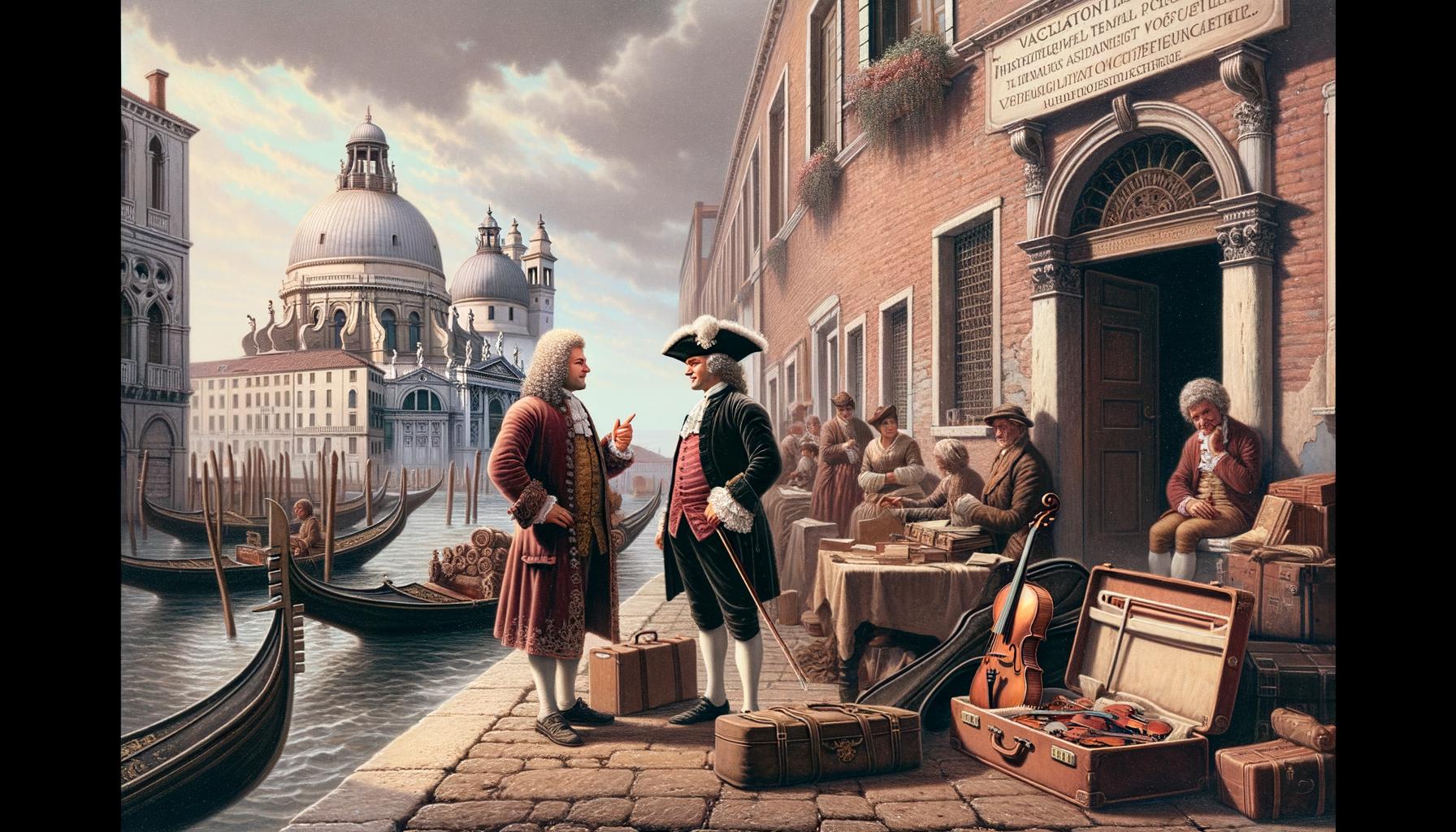Antonio Vivaldi, famously known as the “Red Priest”, was a prolific composer and violinist who made a significant impact on the musical landscape of Venice, Italy. His innovative and vibrant compositions earned him recognition not only in his native city but also across Europe.
Vivaldi’s rise to fame in Venice was accompanied by financial struggles, which eventually led to a pivotal moment in his career: an invitation to Vienna. This article delves into the turning point in Vivaldi’s life when he left Venice for Austria and explores the influence he had on Austrian music during this period.
Vivaldi’s time in Venice was marked by his musical contributions that left an indelible mark on the city. As a composer and violin virtuoso, he shaped the Baroque era with his innovative compositions, particularly his prolific output of concertos, operas, and sacred music.
However, despite his musical achievements, Vivaldi faced financial difficulties due to his turbulent relationship with the Ospedale della Pietà, where he worked as a music director. It was amidst these challenges that a new opportunity arose that would change the course of Vivaldi’s career.
The pivotal moment in Vivaldi’s career came when he received an invitation from Emperor Charles VI to travel to Vienna. This marked a significant turning point as it not only offered Vivaldi relief from his financial struggles but also opened doors to new opportunities in Austria.
The question then arises: who convinced Vivaldi to leave Venice behind and embark on this journey to Austria? This article will explore the circumstances surrounding this decision and shed light on the impact it had on both Vivaldi’s career and Austrian music scene.
Vivaldi’s Musical Contributions in Venice
Antonio Vivaldi, also known as the Red Priest, made significant musical contributions during his time in Venice. His impact on the city’s music scene was profound, and his influence can still be felt today.
Vivaldi’s Innovative Compositions
Vivaldi’s most significant contribution to Venetian music was his innovative compositions. He was a prolific composer, producing over 500 concertos and numerous other vocal and instrumental works. His unique style and virtuosic violin playing captivated audiences and earned him widespread acclaim.
Renowned Music Educator
In addition to his compositions, Vivaldi was also a renowned music educator in Venice. He served as a violin teacher at the Ospedale della Pietà, where he trained young orphaned girls to become skilled musicians. His dedication to music education played a crucial role in shaping the next generation of musicians in Venice.
Rise of Baroque Music in Venice
Vivaldi’s work contributed to the rise of Baroque music in Venice. His compositions exemplified the dramatic and expressive style characteristic of the Baroque period, influencing other composers and shaping the musical landscape of the city. Vivaldi’s impact on Venetian music was undeniable, and his legacy continues to inspire musicians and composers around the world.
Overall, Vivaldi’s musical contributions had a lasting impact on Venice, solidifying his reputation as one of the most influential figures in Italian Baroque music.
Financial Struggles
During his time in Venice, Antonio Vivaldi faced numerous financial struggles, primarily due to his turbulent relationship with the Ospedale della Pietà. Despite composing many of his most famous works for the girls’ orchestra at the Ospedale, Vivaldi often found himself in conflict with the institution’s administration. This strained relationship ultimately played a significant role in convincing Vivaldi to leave Venice and seek opportunities elsewhere.
The Ospedale Della Pietà and Vivaldi’s Employment
Vivaldi’s connection to the Ospedale della Pietà began in 1703 when he was appointed as a violin teacher. Over the years, he expanded his role to include music director and composer-in-residence for the all-female ensemble. The Ospedale provided a stable source of income for Vivaldi, but it also came with its share of challenges.
Financial Disputes and Unpaid Debts
Despite his contributions to the Ospedale’s music program, Vivaldi constantly found himself embroiled in financial disputes with the institution. There were frequent conflicts over payment for his services, as well as disagreements about the quality and quantity of compositions he produced for the ensemble. These disputes took a toll on Vivaldi’s financial stability and contributed to his decision to explore opportunities outside of Venice.
The Strain on Vivaldi’s Finances
The ongoing financial strain from his association with the Ospedale della Pietà took a toll on Vivaldi’s overall financial situation. Combined with other economic challenges in Venice, such as increasing competition among musicians and declining demand for opera productions, these factors prompted Vivaldi to entertain the idea of leaving Venice behind. It was during this difficult period that an invitation from Emperor Charles VI presented him with an opportunity to embark on a new chapter in Austria.
Meeting Emperor Charles VI
After years of struggling in Venice, Vivaldi’s career took a major turn when he met Emperor Charles VI of Austria. It was during a visit to Venice that the Emperor first heard Vivaldi play, and he was immediately impressed by the Red Priest’s musical talent. This encounter proved to be the turning point in Vivaldi’s career as it led to an invitation that would change the course of his life.
Emperor Charles VI was so enamored with Vivaldi’s music that he extended an invitation to the composer to come to Vienna and serve as a composer for the imperial court. This offer was a significant opportunity for Vivaldi, who had been facing financial struggles and waning popularity in Venice.
The prospect of working for the Emperor in a prestigious role must have been both validating and enticing for Vivaldi, who accepted the invitation and made plans to leave Venice for Austria.
The decision to leave Venice and travel to Austria was not made lightly by Vivaldi. However, with the support of Emperor Charles VI and the promise of greater opportunities in Vienna, Vivaldi ultimately decided that it was time for a new chapter in his career. This move would prove to have a profound impact on not just Vivaldi’s personal trajectory but also on Austrian music as a whole.
The Invitation to Vienna
After years of struggling financially in Venice, Antonio Vivaldi received a game-changing invitation from Emperor Charles VI of Austria to come to Vienna. It was during this time that Vivaldi’s fame had spread beyond the borders of Italy, with many admirers of his music throughout Europe. The invitation to Vienna marked a turning point in Vivaldi’s career and ultimately led to his departure from Venice.
It was the influential nobleman and music enthusiast, Johann Joseph von Westhoff, who played a pivotal role in convincing Vivaldi to leave Venice and travel to Austria. Westhoff was well-connected in the European music scene and recognized Vivaldi’s unparalleled talent as a composer and violinist. He personally extended the invitation on behalf of Emperor Charles VI, highlighting the emperor’s admiration for Vivaldi’s work and the opportunities that awaited him in Vienna.
Vivaldi was initially hesitant about leaving his beloved Venice, where he had spent most of his life building his musical career. However, it was ultimately Westhoff’s persuasive argument about the potential for a new chapter of success and recognition in Vienna that convinced Vivaldi to make the move.
In 1718, Vivaldi bid farewell to Venice and embarked on a journey that would significantly impact Austrian music and solidify his legacy as one of the greatest composers of the Baroque era.
- Johann Joseph von Westhoff played a pivotal role in convincing Vivaldi
- Westhoff highlighted Emperor Charles VI’s admiration for Vivaldi’s work
- Westhoff persuaded Vivaldi about the potential for success and recognition in Vienna
Vivaldi’s Success in Vienna
After being invited to Vienna by Emperor Charles VI, Antonio Vivaldi found great success and recognition for his musical talents in the Austrian capital. Vivaldi’s time in Vienna marked a significant period in his career, as he was able to showcase his compositions to a new audience and expand his influence beyond Venice.
One of the key figures who convinced Vivaldi to leave Venice and travel to Austria was Emperor Charles VI himself, who recognized the value of having such a renowned composer at his court.
Upon arriving in Vienna, Vivaldi quickly established himself as a prominent figure in the city’s musical scene. He was appointed as a chamber composer by Charles VI and also performed numerous concerts that garnered widespread acclaim. Vivaldi’s compositions were well-received by the Viennese audience, further solidifying his reputation as a leading Baroque composer not only in Italy but also in Austria.
During his time in Vienna, Vivaldi’s influence on Austrian music became evident as he introduced new musical styles and techniques that left a lasting impact on the local music scene. His innovative approach to composition and performance helped shape the development of Austrian music during that period. Additionally, Vivaldi’s success in Vienna contributed to promoting Italian Baroque music across Europe, further enhancing his legacy as a pioneering figure in classical music.
| Venue | Achievement |
|---|---|
| Vienna Court | Appointed as chamber composer by Charles VI |
| Concerts | Performed numerous concerts with widespread acclaim |
Legacy
Antonio Vivaldi’s legacy in the world of music and the Italian Baroque era is undeniable. His influence on both Venice and Austria has left a lasting impact that continues to be celebrated to this day.
Vivaldi’s time in Venice allowed him to establish himself as a prominent figure in the city’s musical scene. His compositions, particularly his set of violin concertos known as The Four Seasons, earned him recognition and admiration from both locals and visitors alike. The Red Priest’s innovative approach to composition and performance solidified his place as one of the most important figures in Baroque music history.
Despite his musical contributions, Vivaldi faced financial struggles during his time in Venice, especially in relation to his position at the Ospedale della Pietà. This turbulent relationship with the institution eventually led to Vivaldi seeking opportunities elsewhere.
It was Emperor Charles VI of Austria who ultimately convinced Vivaldi to leave Venice and travel to Vienna. The emperor recognized Vivaldi’s talent and invited him to serve as a composer for the imperial court. This invitation marked a turning point in Vivaldi’s career, leading him to a new chapter of success and influence in Austria.
Conclusion
In conclusion, Antonio Vivaldi’s journey from Venice to Austria marked a significant turning point in his musical career and legacy. Despite facing financial struggles and turbulent relationships with the Ospedale della Piet, Vivaldi’s impact on the musical culture of Venice cannot be understated. His innovative compositions and contributions as the Red Priest left an indelible mark on the city’s music scene, solidifying his reputation as one of the most influential composers of the Italian Baroque era.
However, it was Vivaldi’s meeting with Emperor Charles VI that ultimately convinced him to leave Venice and travel to Austria. The invitation to Vienna presented a new opportunity for Vivaldi to expand his influence and further develop his musical talents. His success in Vienna not only showcased his abilities as a composer, but also solidified his position as a leading figure in Austrian music during this time.
Vivaldi’s enduring musical legacy continues to inspire musicians and music lovers around the world. His compositions have stood the test of time, leaving an indelible mark on the history of music. Whether it is his famous “Four Seasons” or other lesser-known works, Vivaldi’s contribution to music remains unparalleled. Despite leaving Venice for Austria, Vivaldi’s impact on both cities and their respective musical cultures is an important part of his enduring legacy.
Frequently Asked Questions
Why Did Vivaldi Move to Austria?
Vivaldi moved to Austria in 1740 after experiencing financial difficulties in Venice, where he had lived and worked for many years. He was offered a position as a composer and violinist by Emperor Charles VI.
Who Inspired Vivaldi?
Vivaldi was inspired by the music of his father, Giovanni Battista Vivaldi, who was a professional violinist at St. Mark’s Cathedral in Venice. He also drew inspiration from other Baroque composers such as Arcangelo Corelli and Johann Sebastian Bach.
When Did Vivaldi Live in Venice?
Vivaldi lived in Venice for most of his life, from his birth in 1678 until around 1740 when he moved to Vienna at the invitation of Emperor Charles VI. During his time in Venice, he composed many of his best-known works and established himself as one of the leading composers of the Baroque period.

I’m a passionate traveler, writer, and Italophile. My fascination with Italy’s history, art, and culture has led me on countless adventures across the Italian landscape. Through “I Live Italy,” I share my love for this extraordinary country and aims to inspire others to explore its boundless beauty.





